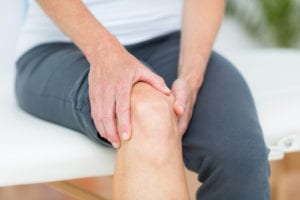Written by Chrystal Moulton, Staff Writer. Patient response on the WOMAC scale demonstrated that 18% of the turmeric group experienced at ≥50% reduction in stiffness (p= 0.0002).
 Osteoarthritis is a degenerative disease characterized by progressive breakdown of the articular joints 1. Osteoarthritis of the knee is a leading cause of disability among adults over the age of 60 2. No effective therapeutic strategies exist to cure or reverse the effects of osteoarthritis 3. Acetaminophen is generally the first therapeutic treatment for pain. Non-steroidal anti-inflammatory drugs and opioids have also been used to treat the pain associated with this disease. However, these methods contribute to long term side effects of the kidney, heart, and gastrointestinal system. 3 Curcumin, an herbal extract well known for its antioxidant and anti-inflammatory properties, has been explored for its use against osteoarthritis. However, curcumin has poor bioavailability and only when combined with other components can absorption of curcumin be increased 4,5. In the current trial, researchers investigated a turmeric formulation called BCM-95® versus acetaminophen in treatment of pain, function, and stiffness in osteoarthritic patients 2.
Osteoarthritis is a degenerative disease characterized by progressive breakdown of the articular joints 1. Osteoarthritis of the knee is a leading cause of disability among adults over the age of 60 2. No effective therapeutic strategies exist to cure or reverse the effects of osteoarthritis 3. Acetaminophen is generally the first therapeutic treatment for pain. Non-steroidal anti-inflammatory drugs and opioids have also been used to treat the pain associated with this disease. However, these methods contribute to long term side effects of the kidney, heart, and gastrointestinal system. 3 Curcumin, an herbal extract well known for its antioxidant and anti-inflammatory properties, has been explored for its use against osteoarthritis. However, curcumin has poor bioavailability and only when combined with other components can absorption of curcumin be increased 4,5. In the current trial, researchers investigated a turmeric formulation called BCM-95® versus acetaminophen in treatment of pain, function, and stiffness in osteoarthritic patients 2.
This study was designed as a randomized active-controlled, non-inferiority, intent-to-treat, prospective study. The study period was 6 weeks. The main goal was to compare the safety and effectiveness of turmeric extract versus acetaminophen on functional improvement and pain reduction in patients with osteoarthritis of the knee. In other words, researchers wanted to see if the turmeric extract was as effective as acetaminophen in relieving pain and stiffness associated with osteoarthritis of the knee. Patients between the age of 40 to 80 years old with chronic knee pain or with radiologic knee osteoarthritis or diagnosed osteoarthritis of the knee based on ACR criteria were included in this trial. Patients were randomly assigned to receive 1000mg of turmeric extract (1 capsule of BCM-95 ® twice daily) or 650 mg of acetaminophen 3 times daily. Symptoms were evaluated at baseline and 6 weeks. The WOMAC Index was used to assess pain, function, and stiffness of the osteoarthritic knee for each patient. Blood samples were also taken at baseline and week 6.
A total of 144 patients successfully completed the trial (73 in the turmeric group and 71 in the acetaminophen group). Researchers found that scores on the WOMAC Index for both groups were equivalent (p<0.05) indicating turmeric extract was as effective as acetaminophen in treating osteoarthritis symptoms. However, by week 6, the turmeric extract group had significant reduction in Tissue Necrosis Factor-alpha levels (p= 0.0529). Additionally, further analysis of patient response to the WOMAC scale demonstrated that 18% of the turmeric group experienced at ≥50% reduction in stiffness (p= 0.0002). Although not significant, 3% of the turmeric group also experienced ≥70% reduction in stiffness (p= 0.1602). In the acetaminophen group, none of the participants reported ≥50% or ≥70% reduction in stiffness; rather the majority (61%) reported ≥20% reduction in stiffness. Common adverse events reported within the turmeric group were tingling sensation (1.37%) and restlessness (4.11%) [5.48% of patients in turmeric group reported any adverse event]. No serious adverse events were reported in either group.
Overall, turmeric extract was equivalent to acetaminophen in effectively reducing pain associated with osteoarthritis of the knee. However, turmeric significantly reduced the level of TNF alpha from baseline to week 6. Furthermore, patients assigned to the turmeric extract reported greater than 50% reduction in stiffness of the knee where members of the acetaminophen group did not. Further studies will be needed to assess the effectiveness of turmeric extract for treatment of osteoarthritis.
Source: Singhal, Shubha, Nazer Hasan, Kirti Nirmal, Rohit Chawla, Shalini Chawla, Bhupinder Singh Kalra, and Anil Dhal. “Bioavailable turmeric extract for knee osteoarthritis: a randomized, non-inferiority trial versus paracetamol.” Trials 22, no. 1 (2021): 1-11.
© The Author(s). 2021 Open Access This article is licensed under a Creative Commons Attribution 4.0 International License
Click here to read the full text study.
Posted June 24, 2021.
Chrystal Moulton BA, PMP, is a 2008 graduate of the University of Illinois at Chicago. She graduated with a bachelor’s in psychology with a focus on premedical studies and is a licensed project manager. She currently resides in Indianapolis, IN.
Reference:
- Lawrence RC, Felson DT, Helmick CG, et al. Estimates of the prevalence of arthritis and other rheumatic conditions in the United States: Part II. Arthritis & Rheumatism. 2008;58(1):26-35.
- Singhal S, Hasan N, Nirmal K, et al. Bioavailable turmeric extract for knee osteoarthritis: a randomized, non-inferiority trial versus paracetamol. Trials. 2021;22(1):105.
- Le Graverand-Gastineau MP. Disease modifying osteoarthritis drugs: facing development challenges and choosing molecular targets. Current drug targets. 2010;11(5):528-535.
- Cuomo J, Appendino G, Dern AS, et al. Comparative absorption of a standardized curcuminoid mixture and its lecithin formulation. J Nat Prod. 2011;74(4):664-669.
- Jin MJ, Han HK. Effect of piperine, a major component of black pepper, on the intestinal absorption of fexofenadine and its implication on food-drug interaction. J Food Sci. 2010;75(3):H93-96.
